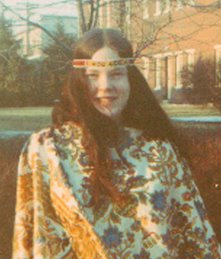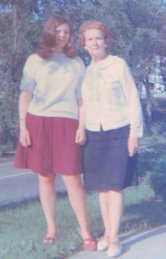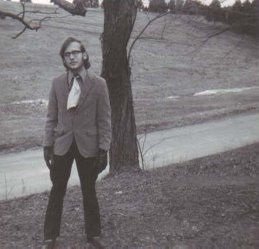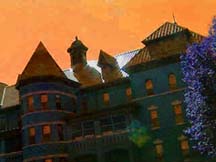
Goaded, impelled, pushed, forced.
A hazy memory of riding in a caged police car. Two shadows in the front seat, the county sheriff and a female escort, jabbering about nothing important, ignoring me.
I was cargo, to be delivered, against my will, from the Woodbury County courthouse to the Cherokee Mental Health Institute–about an hour’s drive from Sioux City.
February 1969, the Iowa landscape bleak: cloudy and cold, condensation and frost riming the windows, piles of dirty snow dotting the countryside.
Inside the cage, hot and steamy, though I shivered, my teeth chattering.
Please turn up the heat!
But cargo has no voice.
For all the importance–then and now–of this drive, I remember little, except for one other detail: my terror.
How does one describe terror in literal terms?
The shivering, of course. No matter how high the heat might have been cranked up, I felt cold and bloodless. Unhuman.
Am I really crazy?
I had to pee; after the competency hearing, where I’d been deemed fit for commitment, I’d been escorted to a windowless room, ordered to sit on wooden chair, and locked inside, where I remained alone, for hours without food, water, or access to a toilet.
Crying and railing against my grandparents. Against Opal Casey, the police matron who took their side. Against my lawyer, who did nothing at all.
And then the sheriff and escort arrived, suddenly in a hurry. "Come along, you."
"I have to go to the bathroom."
"It can wait," the woman said.
Two terrors: the possibility of wetting myself and being thrown into a dark pit, never to see the light, ever again.
At 18, I wasn’t sure which terror was worse.
The specter of Cherokee haunts Northwest Iowa, potential clientele living in Woodbury County and 40 other Iowa counties.
In the local lexicon of my youth, "going to Cherokee" was synonymous with going crazy; at least three generations of misbehaving schoolchildren were chided by their parents for "driving them to Cherokee."
Back in the 50's and 60's, actually going to Cherokee was unthinkable–just the threat enough to whip most incorrigible kids into shape.
But, for me, those colloquial terms are literal and stark.
I did go to Cherokee.
I was driven there.
For years, I wouldn’t speak of my time there and how it informed and shaped my life.
It was my secret, driven by my own silence and the complicity of my family.









